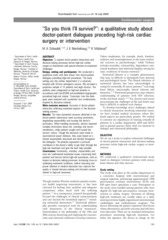| dc.contributor.author | Schaufel, Margrethe Aase | en_US |
| dc.contributor.author | Nordrehaug, Jan Erik | en_US |
| dc.contributor.author | Malterud, Kirsti | en_US |
| dc.date.accessioned | 2011-07-28T12:18:37Z | |
| dc.date.available | 2011-07-28T12:18:37Z | |
| dc.date.issued | 2009 | eng |
| dc.Published | Heart 95(15): 1245-1249 | en_US |
| dc.identifier.issn | 1355-6037 | |
| dc.identifier.uri | https://hdl.handle.net/1956/4858 | |
| dc.description.abstract | Objective: To explore doctor-patient interactions and decision-making processes before high-risk cardiac surgery or intervention with special attention to existential challenges. Design, setting and participants: We conducted a qualitative study with data drawn from doctor-patient dialogues preceding high-risk procedures. The study setting was the cardiac department of a university hospital with 24-hour emergency service. We recruited a purposive sample of 10 patients and eight doctors. The patients were categorised as high-risk patients in accordance with EuroSCORE and established angiographic procedural high-risk criteria. Transcripts from the dialogues were analysed with systematic text condensation, inspired by discourse analysis. Main outcome measure: Accounts of doctor-patient interaction reflecting existential aspects of the decisionmaking process. Results: The main existential concerns identified in the doctor-patient interactions were surviving uncertainty, negotiating responsibility and trusting the doctor’s proficiency. When handling uncertainty, doctors imparted complex information about risk, warnings and recommendations, while patients sought and trusted the doctors’ advice. Though the decisions were made in asymmetrical power relations, they were based on a shared responsibility discussed and defined throughout the dialogues. The patients expressed a profound confidence in the doctor’s ability to get them through the high-risk treatment and give the best help possible. Conclusions: Uncertainty, mortality, responsibility and trust are fundamental existential issues concerning both patients and doctors before high-risk procedures, with an impact on decision-making processes. Increasing focus on underlying existential conditions, ethical reasoning and power relations in medical education may improve the quality of shared decision-making and informed consent related to high-risk treatment. | en_US |
| dc.language.iso | eng | eng |
| dc.publisher | BMJ Publishing Group | eng |
| dc.title | ‘‘So you think I’ll survive?’’: a qualitative study about doctor-patient dialogues preceding high-risk cardiac surgery or intervention | en_US |
| dc.type | Peer reviewed | |
| dc.type | Journal article | |
| dc.description.version | publishedVersion | en_US |
| dc.rights.holder | Copyright 2009 BMJ Publishing Group Ltd and the British Cardiovascular Society | |
| dc.rights.holder | BMJ Publishing Group Ltd and the British Cardiovascular Society | |
| dc.identifier.doi | https://doi.org/10.1136/hrt.2008.164657 | |
| dc.subject.nsi | VDP::Medical disciplines: 700::Clinical medical disciplines: 750::Cardiology: 771 | eng |
| dc.subject.nsi | VDP::Medical disciplines: 700::Health sciences: 800::Medical/dental ethics, behavioural sciences, history: 805 | eng |
